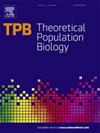Stochastic offspring distributions amplify selection bias in mutation accumulation experiments
IF 1.3
4区 生物学
Q4 ECOLOGY
引用次数: 0
Abstract
Mutation accumulation (MA) experiments play an important role in understanding evolution. For microbial populations, such experiments often involve periods of population growth, such that a single individual can make a visible colony, followed by severe bottlenecks. Previous work has quantified the effect of positive and negative selection on MA experiments, demonstrating for example that with 20 generations of growth between bottlenecks, big-benefit mutations can be over-represented by a factor of five or more (Wahl and Agashe, 2022). This previous work assumed a deterministic model for population growth. We now develop a fully stochastic model, including realistic offspring distributions that incorporate genetic drift and allow for the loss of rare lineages. We demonstrate that when stochastic offspring distributions are considered, selection bias is even stronger than previously predicted. We describe several analytical and numerical methods that offer an accurate correction for the effects of selection on the observed distribution of fitness effects, describe the practical considerations in implementing each method, and demonstrate the use of this correction on simulated MA data.
随机子代分布放大了突变积累实验中的选择偏倚。
突变累积(MA)实验在了解进化方面发挥着重要作用。对于微生物种群来说,此类实验通常涉及种群增长期,例如单个个体就能形成一个可见的菌落,随后是严重的瓶颈期。之前的研究已经量化了正向和负向选择对 MA 实验的影响,例如,在瓶颈期之间的 20 代增长中,大收益突变的比例可能会超过 5 倍或更多(Wahl 和 Agashe,2022 年)。之前的研究假设了一个确定性的种群增长模型。我们现在建立了一个完全随机的模型,包括现实的后代分布,其中包含遗传漂变并允许稀有品系的消失。我们证明,当考虑到随机后代分布时,选择偏差甚至比以前预测的更强。我们介绍了几种分析和数值方法,这些方法可以准确校正选择对观察到的适性效应分布的影响,描述了实施每种方法时的实际考虑因素,并在模拟 MA 数据上演示了这种校正方法的使用。
本文章由计算机程序翻译,如有差异,请以英文原文为准。
求助全文
约1分钟内获得全文
求助全文
来源期刊

Theoretical Population Biology
生物-进化生物学
CiteScore
2.50
自引率
14.30%
发文量
43
审稿时长
6-12 weeks
期刊介绍:
An interdisciplinary journal, Theoretical Population Biology presents articles on theoretical aspects of the biology of populations, particularly in the areas of demography, ecology, epidemiology, evolution, and genetics. Emphasis is on the development of mathematical theory and models that enhance the understanding of biological phenomena.
Articles highlight the motivation and significance of the work for advancing progress in biology, relying on a substantial mathematical effort to obtain biological insight. The journal also presents empirical results and computational and statistical methods directly impinging on theoretical problems in population biology.
 求助内容:
求助内容: 应助结果提醒方式:
应助结果提醒方式:


